初中中考英语常见词语辨析(一)
中考英语复习第一节 形容词和副词词义辨析

第一节形容词和副词词义辨析,河北五年中考命题规律及趋势考纲要求 1.形容词辨析2.副词辨析3.混合辨析考查点年份题号选项设置分值形容词词义辨析201942 different/similar/large/small 1分201828 clever/brave/funny/careful 1分39 wide/safe/smooth/thick 1分42 hopeful/comfortable/valuable/successful 1分201728 patient/lucky/possible/traditional1分40 lazy/noisy/hungry/sleepy 1分44 helpful/harmful/peaceful/painful1分201631 sweet/lucky/strange/funny 1分46 bored/tired/hungry/thirsty 1分201530 thankful/careful/useful/helpful 1分41 heavy/full/much/long 1分78 a sleep1分副词词义辨析201935 still/always/already/almost1分38 Easily/Finally/Safely/Quickly 1分201743 quietly/proudly/politely/suddenly1分201643 busily/quickly/bravely/suddenly 1分201533 mainly/really/possibly/hardly 1分形容词、副词转换201979 deeply(deep) 1分201874 happily(happy) 1分201774 carefully(careful) 1分201678 easily(easy) 1分201577 safely(safe) 1分河北中考单项选择、完形填空主要涉及形容词和副词的词义辨析,且侧重在语境中的运用,而且更多的为形容词词义的辨析。
中考英语最常考50组重点词语辨析

【导语】中考英语词语辨析主要出现在单选或完形填空中,在平常的英语学习中,同学们可能缺少系统的词语辨析训练,所以考试遇到这类考点总是丢分,今天⽆忧考和⼤家分享中考英语最常考的50组重点词语辨析,帮助⼤家扫清词语辨析的障碍!提⾼考试分数,⼀起看看吧。
中考英语最常考50组重点词语辨析(⼀)1. after, in这两个介词都可以表⽰“……(时间)以后”的意思。
after 以过去为起点,表⽰过去⼀段时间之后,常⽤于过去时态的句⼦中。
She went after three days.她是三天以后⾛的。
in 以现在为起点,表将来⼀段时间以后,常⽤于将来时态的句⼦中。
She will go in three days.她三天以后要⾛。
2. how long, how often, how soonhow long指多长时间,主要⽤来对⼀段时间(如three days, four weeks 等)提问。
How long ago was it?这是多久前的事了?how often指每隔多久,主要⽤来对频率副词或状语(如once a week等)提问。
—How often does he come here? —Once a month.他(每隔)多久来⼀次?每⽉⼀次?how soon指再过多久,主要⽤来对表⽰将来的⼀段时间(in an hour, in two weeks 等)提问。
How soon can you come?你多快能赶来?3. few, a few, little, a little, several, somefew 和little的意思是否定的,表⽰“很少”或“⼏乎没有”;⽽a few和a little的意思是肯定的,表⽰“有⼀些,有⼀点⼉”。
few 和 a few修饰可数名词;little 和 a little 修饰不可数名词。
several⽤于修饰可数名词,语意⽐a few和some更肯定,含有“好⼏个”的意思。
中考词汇总结高频词汇与词义辨析
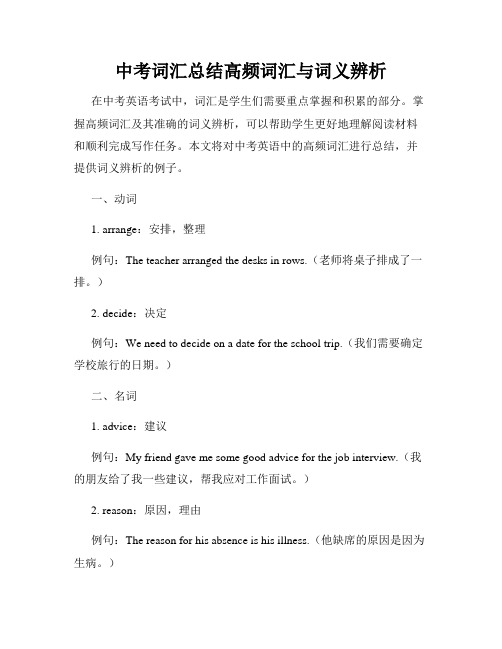
中考词汇总结高频词汇与词义辨析在中考英语考试中,词汇是学生们需要重点掌握和积累的部分。
掌握高频词汇及其准确的词义辨析,可以帮助学生更好地理解阅读材料和顺利完成写作任务。
本文将对中考英语中的高频词汇进行总结,并提供词义辨析的例子。
一、动词1. arrange:安排,整理例句:The teacher arranged the desks in rows.(老师将桌子排成了一排。
)2. decide:决定例句:We need to decide on a date for the school trip.(我们需要确定学校旅行的日期。
)二、名词1. advice:建议例句:My friend gave me some good advice for the job interview.(我的朋友给了我一些建议,帮我应对工作面试。
)2. reason:原因,理由例句:The reason for his absence is his illness.(他缺席的原因是因为生病。
)三、形容词1. polite:有礼貌的例句:Emily is always polite to her elders.(艾米莉对长辈总是非常有礼貌。
)2. honest:诚实的例句:He is an honest person and never tells lies.(他是一个诚实的人,从不说谎。
)四、副词1. quickly:快速地例句:She finished the race quickly and won the first place.(她迅速完成了比赛并获得了第一名。
)2. quietly:安静地例句:Please read quietly in the library.(请在图书馆安静地阅读。
)词义辨析:1. forget与remember虽然forget和remember都有“记住”的意思,但用法上有所不同。
forget表示“忘记”,后接名词或动名词,而remember表示“记得”,后接名词、动名词、动词-ing形式或从句。
中考英语易错词词语辨析

中考英语易错词词语辨析
any/ some
Ⅰ.any 一些、一点、(有时不宜译出)一般用于疑问句、否认句。
如:
① Have you any new books? 你有(什么)新书吗?No, I have not any new books. 我没什么新书。
② Have you any money with you? 你身边带了一些钱吗?
Ⅱ.some 一些、一点一般用于肯定句。
如:
① I have some new books. 我有一些新书。
[注]:
① any用于肯定句中时,表任何、随便等意思。
如You may e at any time. 你随便什么时候来都可以。
②some 用于疑问句时,表期望得到肯定的答复或邀请或请求等意思。
通常用在带情态动词的问句是。
如:
1. Arent there some envelops in that drawer? 那个抽屉不是有些信封吗?
2. Would you have some tea?您喝点茶吗?
anyone/ any one
Ⅰ. anyone 任何人其后不跟of 短语。
如:
Is there anyone at home.?
Ⅱ. any one 任何人/物其后可跟 of 短语。
如:
Ill send you any one of these pens.
[注]:类似的用法还有:everyone every one.。
2024中考备考英语重难点01 易混名词辨析(解析版)
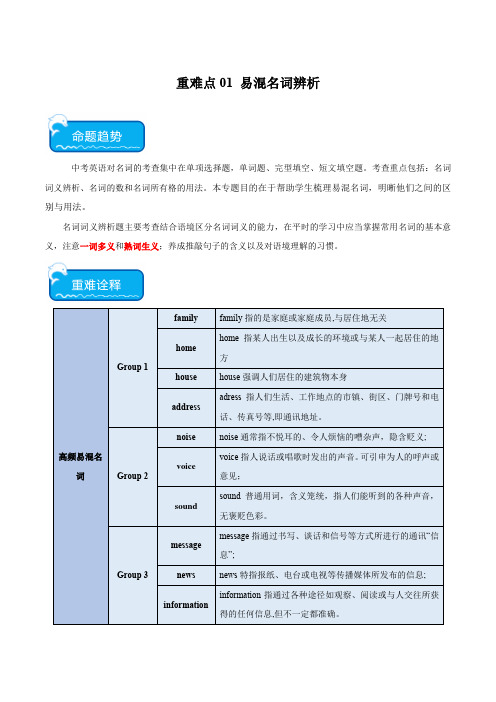
重难点01 易混名词辨析中考英语对名词的考查集中在单项选择题,单词题、完型填空、短文填空题。
考查重点包括:名词词义辨析、名词的数和名词所有格的用法。
本专题目的在于帮助学生梳理易混名词,明晰他们之间的区别与用法。
名词词义辨析题主要考查结合语境区分名词词义的能力,在平时的学习中应当掌握常用名词的基本意义,注意一词多义和熟词生义;养成推敲句子的含义以及对语境理解的习惯。
(2023中考真题建议用时:15分钟)1.(2023·辽宁鞍山·中考真题)—Why does Mary get good grades each time?—I think that’s because she puts most of her ________ into her schoolwork.A.energy B.practice C.exercise D.process2.(2023·内蒙古·中考真题)—The model plane is wonderful! How did you make it?—It’s easy. Follow the ________ and you can do it, too.A.discussion B.education C.conditions D.instructions3.(2023·江苏淮安·中考真题)As a student, you should keep a ________ between your schoolwork and yourhobbies.A.diary B.record C.secret D.balance4.(2023·湖北襄阳·中考真题)—Mr. Fan runs at least half an hour every day.—What a good ________! No wonder he looks healthy.A.habit B.question C.article D.prediction5.(2023·湖北黄石·中考真题)—Could you tell me the ________ of making such tasty dumplings?—Well, I just follow the steps on Tiktok.A.cost B.method C.time D.menu6.(2023·内蒙古呼和浩特·中考真题)High-speed trains are seen as one of the new Four Great ________ of China.A.Inventions B.Advantages C.Environments D.Technologies7.(2023·江苏常州·中考真题)After she was brought back to China, the sick giant panda Ya Ya received good ________ in her new home and got better.A.education B.communication C.entertainment D.treatment8.(2023·江苏南通·中考真题)—________ are easily made, but not easily kept.—That’s true. Once you make one, be sure to keep it.A.Speeches B.Decisions C.Promises D.Suggestions9.(2023·江苏镇江·中考真题)The main ________ of the cities along the Grand Canal (大运河) is history and culture.A.attraction B.pollution C.invention D.situation10.(2023·青海·中考真题)A taxi driver prevented (阻止) an _________ when he saw a car with serious problems travelling across Huangnan.A.accident B.interview C.advertisement11.(2023·山东青岛·中考真题)Before flying a plane, a ________ must take a lot of training.A.policeman B.musician C.nurse D.pilot12.(2023·湖北十堰·中考真题)—How did you fix up the machine, dad?—It’s easy. I just followed the ________.A.instructions B.inventions C.interviews D.influences13.(2023·江苏徐州·中考真题)Of all the ________, I love summer best.A.seasons B.subjects C.colours D.hobbies14.(2023·辽宁丹东·中考真题)Mary’s parents are interested in ________, so they often take her to concerts.A.sports B.music C.science D.movies15.(2023·江苏宿迁·中考真题)—The girl’s beautiful pronunciation caught our ________ in yesterday’s English speech competition.—Yes, many students couldn’t help cheering for her.A.condition B.attention C.invention D.position16.(2023·江苏泰州·中考真题)—Good news! The Chinese women table tennis team won a gold and a silver again.—Great! No matter who wins the medals, it is the ________ of our country.A.price B.pioneer C.pride D.pain17.(2023·黑龙江牡丹江·中考真题)Although our school life is a little busy, it is full of ________.A.pain B.sadness C.laughter18.(2023·四川遂宁·中考真题)—Which movie would you like to watch, Tracy?— Um…it’s hard to make a ________.A.survey B.choice C.call D.wish19.(2023·辽宁·中考真题)Thanks to the teacher’s help, I solved all the ________ easily.A.chances B.problems C.habits D.grades20.(2023·辽宁营口·中考真题)Scientists who are full of ________ always come up with new ideas and bring great changes to our life.A.instruction B.instrument C.invention D.introduction1.A【详解】句意:——为什么玛丽每次都取得好成绩?——我想那是因为她把大部分精力都放在功课上了。
英语中考牢记20组易混易错词语辨析
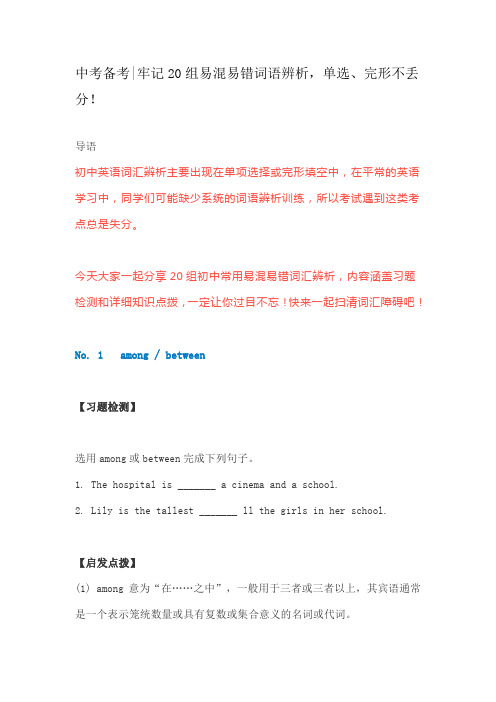
中考备考|牢记20组易混易错词语辨析,单选、完形不丢分!导语初中英语词汇辨析主要出现在单项选择或完形填空中,在平常的英语学习中,同学们可能缺少系统的词语辨析训练,所以考试遇到这类考点总是失分。
今天大家一起分享20组初中常用易混易错词汇辨析,内容涵盖习题检测和详细知识点拨,一定让你过目不忘!快来一起扫清词汇障碍吧!No. 1 among / between【习题检测】选用among或between完成下列句子。
1. The hospital is _______ a cinema and a school.2. Lily is the tallest _______ ll the girls in her school.【启发点拨】(1) among意为“在……之中”,一般用于三者或三者以上,其宾语通常是一个表示笼统数量或具有复数或集合意义的名词或代词。
(2) between一般指两者之间,其宾语通常是表示两者概念的名词或代词,或由and连接的两个具体的人或物。
between有时也可表示多者之中的“两两之间”。
如:Switzerland lies between France, Germany, Austria and Italy.Key:1. between2. amongNo. 2 lay / lie【习题检测】用lay或lie的适当形式完成句子。
1. I _______ the table when my mother cooked the meal.2. John was ill and _______ in bed all morning.【启发点拨】(1) lay作动词,可意为“摆放(餐桌)”,其过去式与过去分词均为laid,现在分词为laying,常用于短语lay the table,意为“摆放餐桌”。
如:Tom was laying the table.(2) lie作动词,意为“躺;平躺”时,过去式为lay,过去分词为lain,现在分词为lying。
中考英语词语辨析题分析
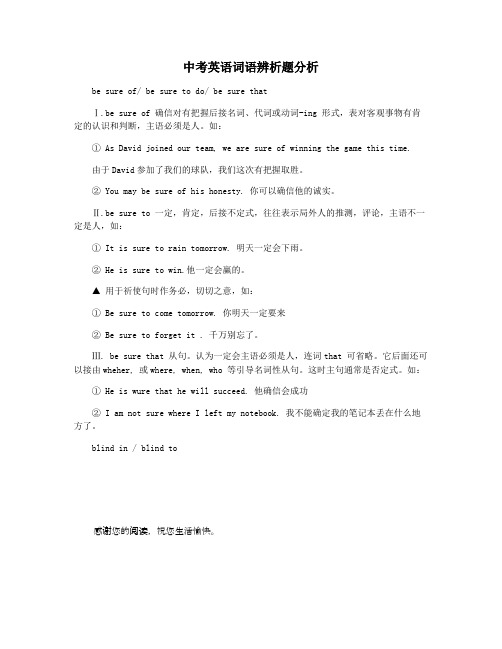
中考英语词语辨析题分析
be sure of/ be sure to do/ be sure that
Ⅰ.be sure of 确信对有把握后接名词、代词或动词-ing 形式,表对客观事物有肯定的认识和判断,主语必须是人。
如:
① As David joined our team, we are sure of winning the game this time.
由于David参加了我们的球队,我们这次有把握取胜。
② You may be sure of his honesty. 你可以确信他的诚实。
Ⅱ.be sure to 一定,肯定,后接不定式,往往表示局外人的推测,评论,主语不一定是人,如:
① It is sure to rain tomorrow. 明天一定会下雨。
② He is sure to win.他一定会赢的。
▲ 用于祈使句时作务必,切切之意,如:
① Be sure to come tomorrow. 你明天一定要来
② Be sure to forget it . 千万别忘了。
Ⅲ. be sure that 从句。
认为一定会主语必须是人,连词that 可省略。
它后面还可以接由wheher, 或where, when, who 等引导名词性从句。
这时主句通常是否定式。
如:
① He is wure that he will succeed. 他确信会成功
② I am not sure where I left my notebook. 我不能确定我的笔记本丢在什么地方了。
blind in / blind to
感谢您的阅读,祝您生活愉快。
初中基础单词容易混淆的词汇
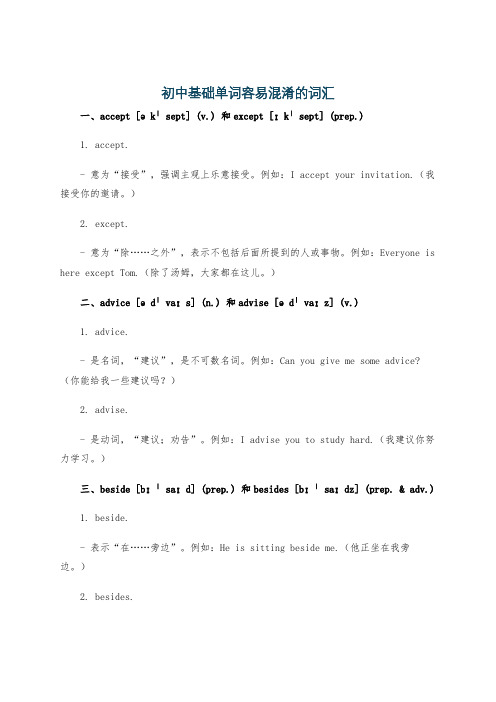
初中基础单词容易混淆的词汇一、accept [əkˈsept] (v.) 和except [ɪkˈsept] (prep.)1. accept.- 意为“接受”,强调主观上乐意接受。
例如:I accept your invitation.(我接受你的邀请。
)2. except.- 意为“除……之外”,表示不包括后面所提到的人或事物。
例如:Everyone is here except Tom.(除了汤姆,大家都在这儿。
)二、advice [ədˈvaɪs] (n.) 和advise [ədˈvaɪz] (v.)1. advice.- 是名词,“建议”,是不可数名词。
例如:Can you give me some advice?(你能给我一些建议吗?)2. advise.- 是动词,“建议;劝告”。
例如:I advise you to study hard.(我建议你努力学习。
)三、beside [bɪˈsaɪd] (prep.) 和besides [bɪˈsaɪdz] (prep. & adv.)1. beside.- 表示“在……旁边”。
例如:He is sitting beside me.(他正坐在我旁边。
)2. besides.- 作介词时,意为“除……之外(还有)”;作副词时,意为“而且;此外”。
例如:Besides English, we also learn French.(除了英语,我们还学法语。
);I don't like this dress. Besides, it's too expensive.(我不喜欢这条裙子。
而且,它太贵了。
)四、borrow [ˈbɒrəʊ] (v.) 和lend [lend] (v.)1. borrow.- 意为“借入”,常用搭配borrow sth. from sb.。
例如:I borrow a book from the library.(我从图书馆借了一本书。
- 1、下载文档前请自行甄别文档内容的完整性,平台不提供额外的编辑、内容补充、找答案等附加服务。
- 2、"仅部分预览"的文档,不可在线预览部分如存在完整性等问题,可反馈申请退款(可完整预览的文档不适用该条件!)。
- 3、如文档侵犯您的权益,请联系客服反馈,我们会尽快为您处理(人工客服工作时间:9:00-18:30)。
中考英语常见词语辨析(一)蕴才辅导中心1.a few/ few(1)a few, few 用来修饰可数名词。
(2)a few “有一些”,表示肯定概念,few 几乎没有,表示否定意义。
[例] The man has been here for many years, so he has a few friends.这个人在这里住了很多年了,他有一些朋友。
I am a new comer here, so I have few friends here.我刚来到这里,所以我在这里没有几个朋友。
..........................................................................2.a little/ little(1) a little, little 用于修饰不可数名词。
(2) a little “有一些”,表示肯定概念。
little “几乎没有”,表示否定概念。
[例] There is a little water in the glass.杯子里有一些水。
There is little water in the glass, so you can’t drink any.杯子里几乎没有水了,你不可能喝到水了。
..........................................................................3.arrive / reach/ get(1) arrive vi.arrive + in + 大地方(国家、城市等)arrive + at + 小地方(村庄、车站、码头等)He arrived in Nanning last week. 他上星期来到南宁。
(2) get vi.\get to + 名词When did you get to the station yesterday?你昨天什么时候到达火车站?reach vt.\reach + 名词Please write to me when you reach Beijing.你到北京后请给我写信。
当reach、arrive、get后接地点副词here、there、home时,不能后接任何介词。
如:I got/ arrive/ reached home late yesterday.我昨天很晚才到家。
..........................................................................4. agree with/ agree on/ agree to(1)agree with(sb.)表示“与……意见一致”。
I don’t agree with you. 我不同意你的意见。
(2)agree to(sth.)宾语一般为suggestion、plan等,“同意计划、安排”。
We all agreed to your plan. 我们同意你的计划。
(3)agree on 表示“双方就...达成一致协议”。
China and the U.S.A. agreed on the place and time for the next meeting.中美双方就下次会议的时间、地点问题达成了协议。
..........................................................................5. between/ among这两个词都有“在……之间(中)”的意思,但用法不同:(1)between用于表示双方之间的关系,不论双方的数目是多少。
The train runs between Beijing and Nanning.火车在北京和南宁两地间运行。
There is a tree between the two houses.这两座房子之间有一棵树。
(2)among后接人或物必须是三个或三个以上,在一群、一组或一个整体中间。
如:I saw him among the crowd.我看见他在人群中。
London is among the greatest cities of the world.伦敦是世界上最大的城市之一。
..........................................................................6. borrow/ lend(1)二者都有“借”的意思,使用时应注意以谁为中心的问题,borrow是以“我”为中心,“借进”的意思,常与from连用。
如:I’ve borrowed two books from the library.我从图书馆借了2本书。
(2)lend是以“你”为中心,意为“借出”,常跟介词to搭配。
如:Can you lend your dictionary to me?能借你的字典给我吗?(3)这二者都可有这样的结构:borrow sb. sth; lend sb. sth. ..........................................................................7. bring/ take/ fetch/ carry(1)bring意为“带来”,指把某物从别的地方带到说话时的这个地方来。
如:Remember to bring your book tomorrow.记住明天把你的书带来。
(2)take意为“带走”,即把某物带到别的地方去。
It’s going to rain. You’d better take an umbrella with you.要下雨了。
你最好带上一把雨伞。
(3)fetch意为“去取来某物”,它包括一个往返的过程。
如:Will you go and fetch some water?你去取一点水来,好吗?(4)carry一般指“随身携带的细小物品”,此外还多用于汽车、火车等交通工具意为“运载”的意思。
如:He always carries a pocket dictionary with him.他总是随身携带一本袖珍字典。
The bus carried me to the park yesterday.昨天公共汽车把我拉到了公园。
..........................................................................8. be used for/ be used as/ be used by(1)be used for 在这个短语中,介词for表用途,即“用来作……”。
A pen is used for writing.笔是用来书写的。
(2)be used as 在这个短语中,介词as表身份或工具,即“……被用作……”。
English is used as a useful tool in our country.在我国英语被作为一个有用的工具来使用。
(3)be used by 短语中,介词by后接使用的执行者,“为……所使用”之意。
English is used by travelers and business people all over the world.英语被世界上旅游者和商人所使用。
..........................................................................9. besides/ except(1)besides与except用于肯定句时,except意为“除……之外(不再有)”;besides意为“除……之外(还有)”。
试比较:I have another blue pen besides this one.除了这枝外,我还有另一枝蓝色钢笔。
(1+1,共2枝)We all passed the exam except Tom.我们都通过了考试,汤姆除外。
(整体中……汤姆一人不及格)(2)except前几乎总有all、any、every、no及其复合词等词。
He answered all the questions except the last one.除了最后一个问题没答外,其余问题他都答了。
(3)except后接名词、代词、动名词和原形动词,这时except=but;但except后跟副词、介词短语时,不能用but代替。
如:The window is never open except in summer.这扇窗户从来不开,除夏季外。
He did nothing except/ but clean the house.他只是打扫了房子。
..........................................................................10.be anger with/ be angry about/ be angry at(1)be angry with 后只能跟表“人”的名词或代词,意思是“生某人的气”,其后常跟一个表原因的介词for。
The teacher was angry with me for my coming late.老师因为我来晚生气了。
(2)be angry at = be angry about意思是“因某事而愤怒”。
at或about后只能接表“事物”的名词。
如:He is angry with/ about small things.他常为一些小事生气。
He was angry about/ at missing the film.他为错过那场电影而生气。
..........................................................................11. die / dead/ dying/ death(1)die 是终止性动词,不用于被动语态。
He has died.他死了。
He died five weeks ago.他五周前死的。
(2)dead是形容词,表状态,可以跟表示延续的时间状语连用。
His grandfather has been dead for five years.他的祖父去世已经有五年了。
(3)death是名词。
He was sentenced to death.他被判处死刑。
(4)dying意为“要死了”,是现在分词。
试比较:a dead dog 一条死(了的)狗 a dying dog 一条“濒临死亡”的狗初中常见的die短语:die from/ of ……因……而死一、若死因存在于人体之上或之内(主要指疾病、衰老等自身的原因),一般用介词of。
